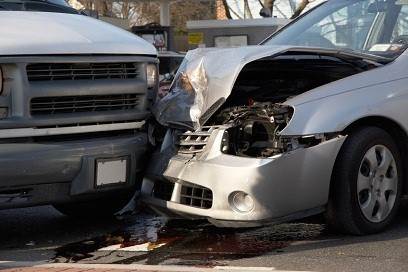 Vehicular homicide was, for many years, categorized as "negligent homicide" under Michigan statutes, but the negligent homicide statute, MCL 750.324, was repealed on January 9, 2009. In its place, the legislature passed two new statutes, reckless driving causing death, MCL 257.626(4), and moving violation causing death, MCL 257.601d.
Vehicular homicide was, for many years, categorized as "negligent homicide" under Michigan statutes, but the negligent homicide statute, MCL 750.324, was repealed on January 9, 2009. In its place, the legislature passed two new statutes, reckless driving causing death, MCL 257.626(4), and moving violation causing death, MCL 257.601d.
The reckless driving statute states that, “Beginning October 31, 2010, a person who operates a vehicle in violation of subsection (2) and by the operation of that vehicle causes the death of another person is guilty of a felony punishable by imprisonment for not more than 15 years or a fine of not less than $ 2,500.00 or more than $ 10,000.00, or both.” Reckless driving causing death carries the same penalties as an OWI causing death, but the prosecutor must prove beyond a reasonable doubt that the person was intentionally driving with wilful and wanton disregard for the safety of others.
A moving violation causing death is a misdemeanor punishable by imprisonment for not more than 1 year or a fine of not more than $ 2,000.00, or both. This is a lesser included offense to reckless driving causing death, but the statute states that, “In a prosecution [for reckless driving resulting in death] the jury shall not be instructed regarding the crime of moving violation causing death.” This issue is currently on appeal with the Michigan Supreme Court, which will decide whether the legislature can prevent a court from providing an instruction on a lesser included offense.
The distinction between these two offenses will inevitably become blurred by prosecutors. It is a civil infraction to run a red light, for example, but it is reckless if the driver intentionally runs a red light on a dare. Grey areas immediately come to mind with this example. What if a man is sleepy and runs a red light? Is that reckless driving or a civil infraction? What if a woman is distracted by children arguing in the back seat and intentionally turns her head to yell at them?
The civil infraction causing death is particularly offensive because "failure to stop within an assured clear distance" is a civil infraction. "Failure to stop within an assured clear distance" is legalese for "a motorist was involved in an accident." This means that, by virtue of being involved in an accident, a motorist may be said to have committed the underlying civil infraction that "cause" a death. This is absurd because, unlike its predecessor statute, it does not necessarily require that the prosecutor prove beyond a reasonable doubt that the driver was negligent.
Most Michigan jurors will approach these cases with common sense, but few licensed drivers actually know the technical rules of the road. For example, in a case where the deceased ran a flashing red light, prosecutors can still charge the motorist who had the yellow light because the statute regulating traffic control devices states that, "Flashing yellow (caution signal). When a yellow lens is illuminated with rapid intermittent flashes, drivers of vehicles may proceed through the intersection or past the signal only with caution." Despite this statutory language, police officers will stop anyone who slows down or stops for a flashing yellow light late at night for suspicion of drunk driving because it is unusual. And traveling through a green light? The statute states that "Vehicular traffic, including vehicles turning right or left, shall yield the right-of-way to other vehicles and to pedestrians and bicyclists lawfully within the intersection or an adjacent crosswalk at the time the signal is exhibited." The prosecutor gets to decide whether the other vehicle was lawfully within the intersection, which means that a jury trial might be required even when a decedent runs a red light opposed by a green light. And what about extraneous rules, such as driving in the fast lane? Statutory language requires a motorist to be in the slowest lane of travel unless overtaking other vehicles.
See also:
Vehicular Manslaughter and Negligent Homicide in Drunk Driving Cases
Murder Charges Arising Out of Drunk Driving Death Cases